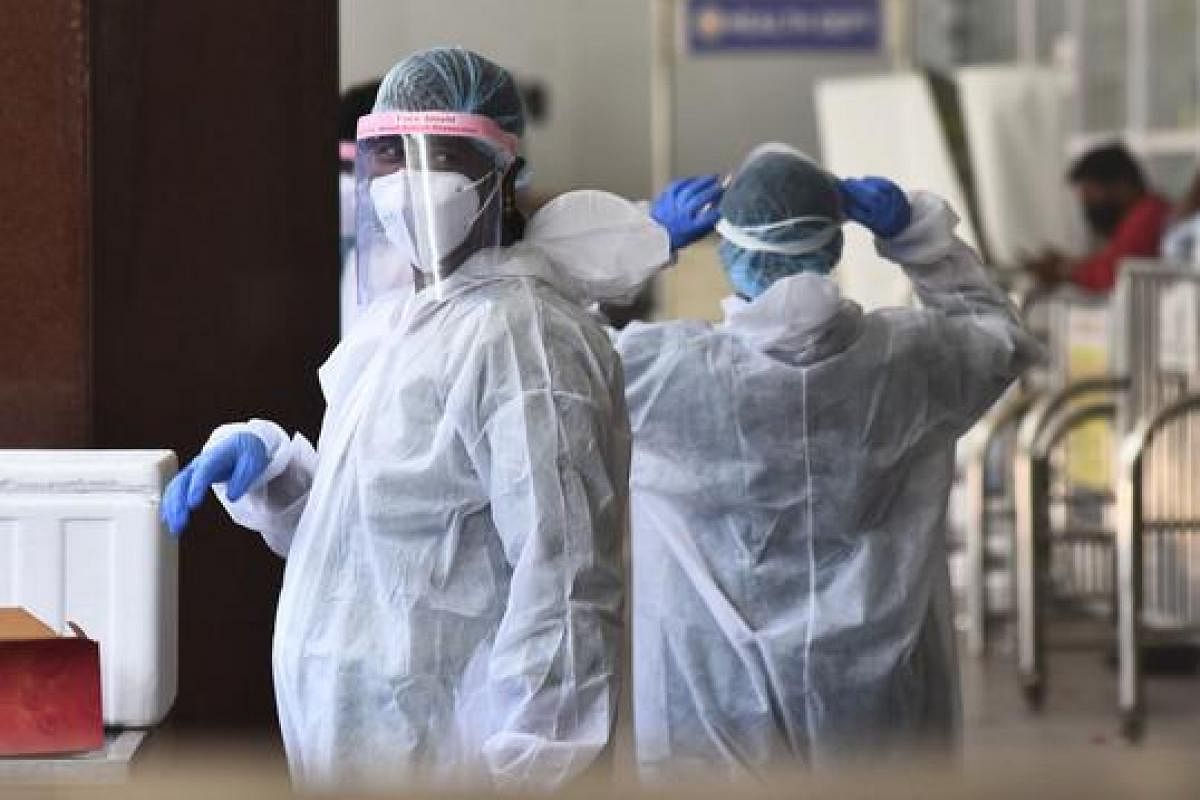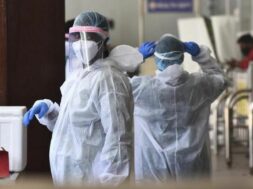
Covid Cases Decline, More People Opting for Home Isolation
Manas Dasgupta
NEW DELHI, Jan 25: Even as India recorded a steep decline in the daily new Covid cases on Tuesday, Kerala reported an alarming increase in the test positivity rate for the first time reaching nearly 50 per cent which meant that every second person tested in the southern state were found Covid infected.
The Union Health Minister Mansukh Mandaviya on Tuesday asked states and Union Territories to ramp up testing in areas where it has gone down. In a meeting with officials from these states and UTs, Mandaviya also urged them to send Covid-19 testing and vaccination data timely. The health minister also told the states that as a large number of people are opting for home isolation, they should be monitored as per national guidelines.
Kerala recorded 55,475 new Covid cases with a test positivity rate of 49.9 per cent. This is the first time that the TPR is almost at 50 per cent while 70 related deaths and 84 deaths that were newly certified as Covid-19 deaths based on the revised rules, were also recorded pushing the death toll to 52,141 in the state. Kerala has been witnessing drastic increase in fresh infections for the past few days. There are 2,85,365 active Covid cases in the state.
India Tuesday reported 2,55,874 Covid-19 cases in the last 24 hours down from 3,06,064 infections a day before, according to the Union Ministry of Health and Family Welfare data. The health ministry’s data also showed as many as 614 fatalities pushed India’s death toll to 4,90,462. The daily positivity rate stands at 15.52 per cent and the weekly figure is 17.17 per cent—both lower than Monday. After 2,67,753 patients recovered from Covid-19 in the last 24 hours, the number of recoveries, has gone up to 3,70,71,898 and the recovery rate now stands at 93.15 per cent.
Mandaviya directed stakeholders to ramp-up COVID testing to keep a close watch on the emerging clusters, hotspots and monitor the trend of hospitalised cases along with the deaths. Speaking at a virtual meeting with State Health Ministers and senior officials of nine States and Union Territories — Jammu and Kashmir, Himachal Pradesh, Punjab, Chandigarh, Uttarakhand, Haryana, Delhi, Ladakh and Uttar Pradesh — the Minister asked them to adopt the hub and spoke model while ensuring that more centres for tele-consultations are opened.
He also asked them to ensure effective monitoring of the substantial number of active cases across the country recuperating from COVID-19 in home isolation while stating that it is important to focus on expanding the reach of tele-consultation services for providing timely, quality healthcare to the beneficiaries.
Stressing that vaccination remains a potent tool to fight COVID-19, the Minister said vaccinated people are less prone to severity and hospitalisation as seen in India and globally. “Higher hospitalisation is being seen in unvaccinated people and hence it becomes crucial to vaccinate the unvaccinated,” he said while directing States to promote vaccination among the 15-18 age group and ensure full coverage in the districts that have shown a lower coverage of the first and second doses.
Meanwhile, a study report said the current COVID-19 vaccines prompt the body to make effective, long-lasting T cells against SARS-CoV-2 that can recognise variants of concern, including Omicron, and protect from severe disease. The research also shows that fully vaccinated people have fewer memory B cells and neutralising antibodies against the Omicron variant. Both T and B cells play an important role in the immune response against an infection.
Scientists at La Jolla Institute for Immunology (LJI) in the US tested four COVID-19 vaccines — Pfizer-BioNTech, Moderna, J&J/Janssen, and Novavax. “The vast majority of T cell responses are still effective against Omicron,” said study co-leader Alessandro Sette, a professor at LJI.
“These cells won’t stop you from getting infected, but in many cases they are likely to keep you from getting very ill,” said co-author Shane Crotty, a professor at LJI. This is true in all the type of vaccines studied, and up to six months after vaccination, said LJI instructor Alba Grifoni, who co-led the work.
These data come from adults who were fully vaccinated, but not yet boosted. Without enough neutralising antibodies, Omicron is more likely to cause a breakthrough infection, the researchers said. Fewer memory B cells means the body will then be slower to churn out additional neutralising antibodies to fight the virus, they said.
“Most of the neutralising antibodies, i.e., the antibodies that work well against SARS-CoV-2, bind to a region called the receptor binding domain, or RBD,” said LJI instructor Camila Coelho, another co-first author of the study. “Our study revealed that the 15 mutations present in Omicron RBD can considerably reduce the binding capacity of memory B cells, compared to other SARS-CoV-2 variants such as Alpha, Beta and Delta,” Coelho said.
The good news, the researchers said, is that neutralising antibodies and memory B cells are just two arms of the body’s adaptive immune response. In a person exposed to SARS-CoV-2, T cells do not prevent infection, they said. However, T cells patrol the body and destroy cells that are already infected, which prevents a virus from multiplying and causing severe disease, the researchers said. The team noted that the “second line of defence” from T cells helps explain why Omicron infections are less likely to lead to severe disease in fully vaccinated people.
To know whether the vaccine-induced T cells were actually effective against variants such as Delta and Omicron, the scientists took a close look at how these cells responded to different viral “epitopes.” Every virus is made up of proteins that form a certain shape or architecture. A viral epitope is a specific landmark on this architecture that T cells have been trained to recognise. The study shows that while the architecture of Omicron is different enough to evade some neutralising antibodies and memory B cells, memory T cells still do a good job of recognising their targets.
Pfizer and BioNTech have begun enrollment for a clinical trial to test the safety and immune response of their Omicron-specific Covid-19 vaccine in adults aged up to 55, the companies said in a statement on Tuesday. Pfizer’s CEO Albert Bourla previously said at a conference that the pharmaceutical giant could be ready to file for regulatory approval of the shot by March.
The company’s head of vaccine research Kathrin Jansen said in a statement that while current data showed that boosters against the original Covid strain continued to protect against severe outcomes with Omicron, the company was acting out of caution. “We recognize the need to be prepared in the event this protection wanes over time and to potentially help address Omicron and new variants in the future,” she said.
Ugur Sahin, CEO of the German biotech company BioNTech added that the protection of the original vaccine against mild and moderate Covid appeared to wane more rapidly against Omicron. “This study is part of our science-based approach to develop a variant-based vaccine that achieves a similar level of protection against Omicron as it did with earlier variants but longer duration of protection.” The trial will involve 1,420 people aged 18-55. A spokesperson for Pfizer said it did not include people older than 55 because the goal of the study was to examine the immune response of participants dosed, rather than estimate vaccine efficacy.













